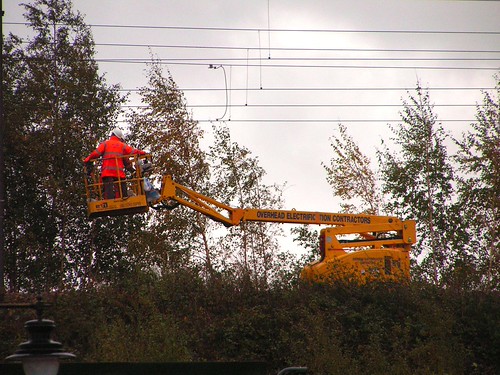In 1981 British Rail and the Department of Transport produced a report (Review of Mainline Electrification) which concluded that even on purely commercial grounds not only was 'a substantial programme of railway electrification financially worthwhile' but that the more extensive and faster options would be better propositions than the more modest ones. It also suggested that the most cost effective way to electrify railways would be by a rolling programme - a specialist team of experts would electrify one line and move on to the next.
Since then, the East Coast Main Line was wired to Edinburgh, and a short section of the Great Western main line has been electrified to Heathrow, but that is about it, and so the expertise has been dispersed. Nowhere else in Europe are there to be found busy lines such as the routes through Reading, operating entirely with diesel traction.
Last year there was a petition on the government's web site, referring to the 1981 report and proposing that a rolling programme of electrification be considered. This received a dismissive response from the Department for Transport, the contrary argument being put forward that there were new forms of traction on the horizon, probably based on fuel cells running on hydrogen. It was also emphasised that the main need was to increase capacity, ignoring the fundamental point that the most effective way to increase capacity is to electrify, as electric trains are lighter and have better acceleration than trains where fuel is converted into energy by some means or other, on board the train itself.
It is good to be able to report that since then, there has been a change in direction. In particular, it has been recognised that there are many short stretches of line, which, if electrified, connect with routes already electrified, making it possible to run under electric traction for long distances; this is the so-called "network effect". But it gets better, and Network Rail now is at long last talking about substantial projects which would bring electrification even to places such as Plymouth and Aberdeen.
There are, of course, lines which would never be worth electrifying and at some point a traction policy will be needed for these too. It is these considerations, together with the likelihood that optimum train speeds in Britain are well below 300kph TGV levels, that could lead eventually to a rational rolling stock policy.
I got involved in a discussion with a Youtuber called “Philosophy all along”. This was in connection with criticism of Trump’s policy of deporting illegal migrants, which he argued would be bad for the economy as it would reduce demand. This implies that there is a need to import people to sustain demand. There is no obvious reason why a population should not be able to consume everything that the same population produces. If it can not, then something else is going on. It is a basic principle that wages are the least that workers will accept to do a job. Wages are a share of the value added by workers through their wages. The remainder is distributed as economic rent, after government has taken its cut in taxes. Monopoly profit is a temporary surplus that after a delay gets absorbed into economic rent. Land values in Silicon Valley are an example of this; it's like a gold rush. The miners get little out of it. Rent and tax syphon purchasing power away from those who produce the g...

Kommentarer